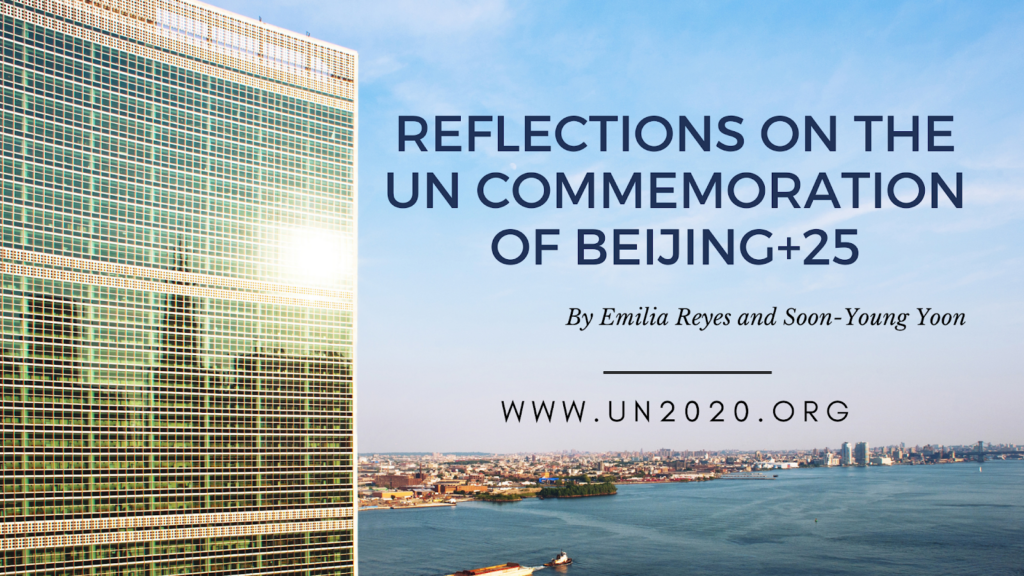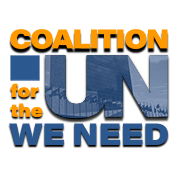
By Emilia Reyes, Co-Convenor of Women Working Group on Financing for Development and Program Director of Policies and Budgets for Equality and Sustainable Development at Equidad de Género: Ciudadanía, Trabajo y Familia
& Soon-Young Yoon, Chair of the Board, Women’s Environment and Development Organization (WEDO) & UN representative for the International Alliance of Women
2020 was supposed to be the year that would revitalize the Beijing+25 Agenda and reaffirm our “collective commitment to multilateralism” according to the theme of the UN 75 Anniversary. The Generation Equality Forum sponsored by Mexico and France was expected to be fully launched to the eyes of the feminist movement and women’s organizations in March, in the context of the Commission of the Status of Women, culminating in a high-level meeting of the General Assembly to commemorate the 25th anniversary of the Fourth World Conference of Women on October 1st. And yet 2020 became a challenging year for humanity. The COVID 19 pandemic –and the multilayered crises that unfolded after it– brought about serious and negative implications for women and girls’ human rights.
We are not exaggerating when we say multiple crises are taking women and girls’ human rights decades back. Several feminists around the world have analyzed the implications in almost every dimension of our agenda: an increase of unpaid domestic and care work in domestic and community spaces; precarious labor in informal settings, despite the fact that women have been at the forefront of the response; exacerbation of violence against women in the context of lockdown; sexual and reproductive rights at risk due to blind policy provisions or nationalistic and conservative take-overs of the health ministries– among others.
We have insisted decades ago, precisely in the Beijing Declaration and Platform for Action, that gender equality and women’s human rights are not meant to be conceived as only as a national issue. Rather, a full understanding of what it means to mainstream gender equality at the core of every actions requires us to center our attention on global macro and structural measures. This is perhaps where Member States have a glaring debt in the face of their international commitments in relation to women’s human rights. Section A. Women and Poverty, Strategic Objective A.1 of the BPfA (page 20) is entirely focused on “Review, adopt and maintain macroeconomic policies and development strategies that address the needs and efforts of women in poverty”. The commitments made by 189 countries at the UN Fourth World Conference on Women in 1995 are in fact very straightforward:
- b) Analyse, from a gender perspective, policies and programmes – including those related to macroeconomic stability, structural adjustment, external debt problems, taxation, investments, employment, markets and all relevant sectors of the economy – with respect to their impact on poverty, on inequality and particularly on women; assess their impact on family well-being and conditions and adjust them, as appropriate, to promote more equitable distribution of productive assets, wealth, opportunities, income and services;
In the context of UN75, COVID 19 has also reminded us of the relevance of the UN, of its democratic promise as well as why we must address the crisis of multilateralism, in which nationalistic agendas have pushed aside a great project of humanity. We have witnessed a scattered and weak response from the global community of countries; corporate capture of deals on vaccines, medical treatments and technologies; a reluctance to enforce the reduction of carbon emissions in the middle of an environmental emergency deepening the negative and pervasive effects of the pandemic; and, to top it all, a lack of true commitment to medium-long measures, and structural and systemic solutions. The different decision-making spaces are filled with short-term proposals.
We need to recover the spirit of a UN that was to steer the world towards equality, peace, sustainable development and human rights. At the core, we need to be reminded every day that women’s human rights are not merely a local or a national agenda. They need to be at the core of a multilateral, global response to enact– with reinvigorated efforts– the Beijing+25 spirit. Above all, we believe this is the time to promote Macro Solutions for Women, the People and the Planet, such reflected in the call to action by the Women’s Working Group on Financing for Development. In this context, we believe it is crucial to promote solidarity within and between social movements, rallying around those issues that are impacting at all levels, from local to national to regional. We are calling for a campaign of campaigns in which we remind ourselves that humanity is one. As such we have the duty to react together, and to act NOW.
